Discovering Your Digital Tribe: A World of Online Communities Awaits
Finding the right online community can boost your business and connect you with fellow creators. This listicle provides 10 online communities examples to help Shopify store owners and arts and crafts businesses like yours thrive. Discover platforms like Tevello, Reddit, and Facebook Groups, each with unique features to solve the problem of connecting with your target audience and fellow entrepreneurs. Explore the pros and cons of each option and find the perfect fit for your needs.
1. Tevello: Build a Thriving Community Within Your Shopify Store
Tevello stands out as a prime online communities example, offering a unique approach to building customer engagement directly within your Shopify store. Specifically designed for Shopify merchants, particularly those in the arts and crafts sector, Tevello eliminates the need for external platforms by seamlessly integrating courses and community features into your existing eCommerce ecosystem. This allows you to cultivate deeper customer relationships, offer valuable educational content, and ultimately boost both digital and physical product sales, all without redirecting customers away from your Shopify store. Imagine offering exclusive workshops, interactive learning paths, and member-only content, all accessible directly from your product pages. This integrated approach strengthens brand loyalty and provides a smooth, unified customer experience.
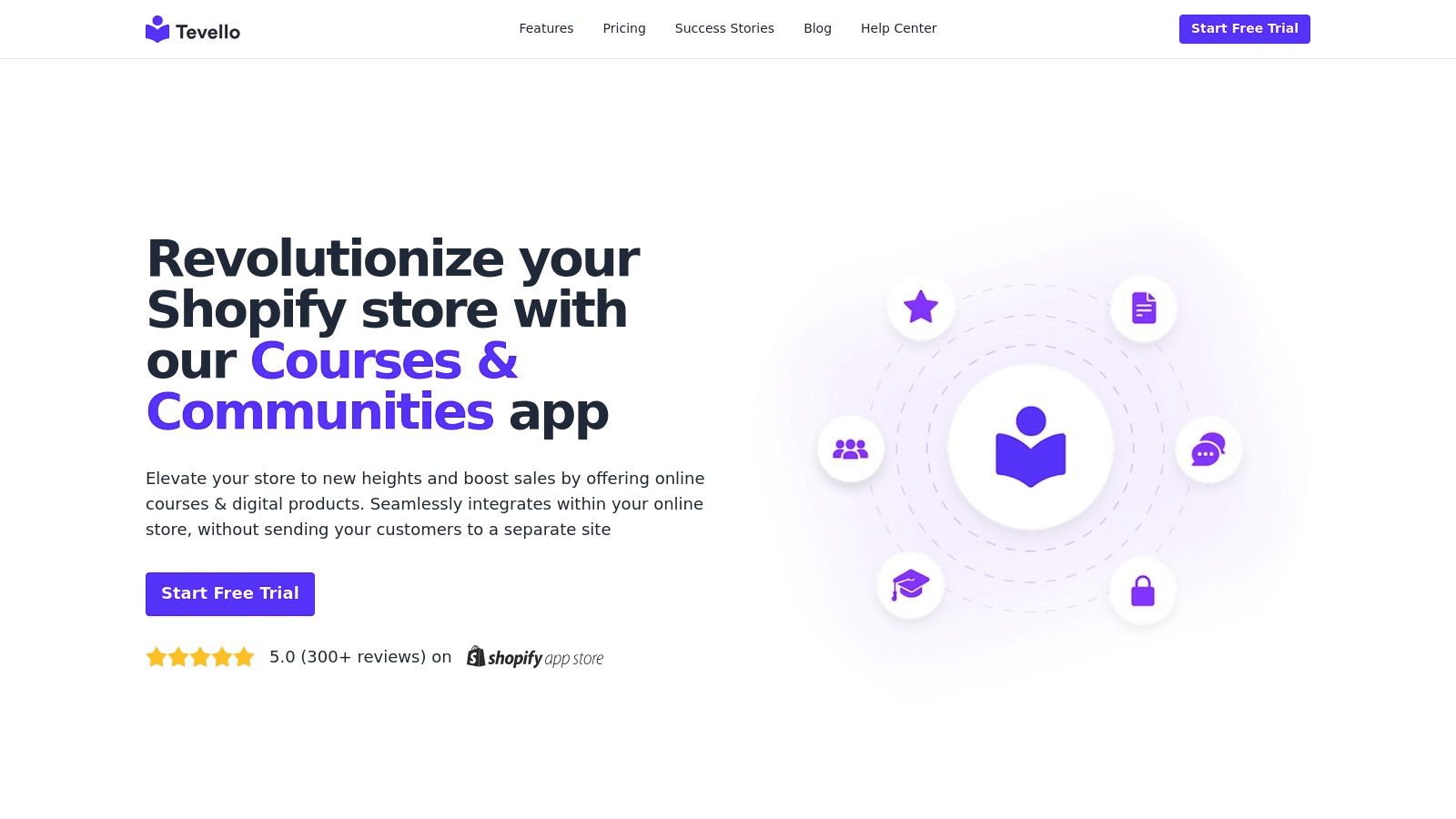
For arts and crafts businesses, Tevello offers a powerful way to enhance the customer journey. For instance, a pottery store owner could offer online courses on glazing techniques, creating a community where customers can share their creations and learn from each other. A jewelry maker could host virtual workshops on specific jewelry-making skills and offer exclusive designs to community members. This not only generates new revenue streams through digital courses and memberships, but also increases the likelihood of repeat purchases of physical products. Tevello’s automation features, powered by Shopify Flow, streamline processes like customer onboarding and course enrollment, freeing up valuable time for merchants to focus on creating engaging content and nurturing their community. Robust video hosting capabilities, including native hosting and integrations with Vimeo, YouTube, and Wistia, provide flexibility in delivering high-quality video content.
Tevello also shines with its multilingual support and customizable community visibility settings (open, private, secret, or hidden), catering to diverse business needs and target audiences. This granular control allows merchants to tailor the community experience, creating exclusive spaces for premium members or fostering open collaboration among all customers. With a stellar 5.0 rating from over 300 reviews, Tevello's user-friendly setup and industry-leading developer-level support further solidify its position as a top choice for Shopify merchants looking to build thriving online communities. The platform boasts impressive results, having helped merchants sell over 4,000 courses and generate over $112K in digital product revenue.
Pros:
- Seamlessly integrates courses and communities directly into Shopify stores.
- Automates key tasks like customer onboarding and course enrollment with Shopify Flow integration.
- Supports multi-lingual course delivery and flexible community-building options.
- Offers robust video hosting, including native hosting and embed options from Vimeo, YouTube, and Wistia.
- Highly rated (5.0 from 300+ reviews) with exceptional developer support and easy setup.
Cons:
- Pricing details require a direct inquiry or demo request, which might be a hurdle for budget-conscious merchants.
- Some users new to Shopify or course-building may require an initial learning curve despite the comprehensive support provided.
Website: https://tevello.com
While Tevello doesn't publicly list its pricing, the robust features and impressive success stories suggest it's a valuable investment for Shopify merchants seeking to create thriving online communities and expand their revenue streams. If you’re a Shopify store owner, especially in the arts and crafts space, exploring Tevello's capabilities could significantly enhance your customer engagement and business growth.
2. Reddit
Reddit stands as a prime example of a thriving online community platform and deserves its place on this list due to its sheer size, diverse communities, and engagement potential. This platform, organized into thousands of niche communities called "subreddits," offers a powerful way for Shopify store owners and arts and crafts business owners to connect with potential customers, gain market insights, and build brand awareness. It's a potent tool for discovering online communities examples in action.
Reddit functions like a massive, interactive forum. Users subscribe to subreddits based on their interests, from specific crafts like knitting or woodworking to broader topics like entrepreneurship or e-commerce. Within these subreddits, users share content, participate in discussions, and vote on posts using an upvote/downvote system. This system acts as a form of community curation, pushing high-quality content to the top. Reddit's karma system further encourages valuable contributions by rewarding users for posting engaging content and helpful comments.
Practical Applications for Shopify & Arts & Crafts Businesses:
- Market Research: Subreddits dedicated to specific crafts or shopping provide valuable insights into customer preferences, trending products, and competitor activity. For example, a handmade jewelry business owner could join subreddits like r/jewelrymaking, r/etsy, or r/shopify to understand current trends and customer pain points.
- Targeted Advertising: While not free, Reddit offers advertising options that allow you to target specific subreddits. This allows for highly targeted campaigns reaching users actively interested in your niche.
- Community Building: Creating or engaging with a subreddit related to your brand or product category fosters a sense of community around your business. This can translate into loyal customers and brand advocates. An artist could share their work-in-progress in a relevant subreddit, fostering discussion and building excitement.
- Customer Service: Reddit can be a channel for addressing customer questions and resolving issues publicly, demonstrating transparency and building trust.
- Content Promotion: Sharing blog posts, product updates, or behind-the-scenes glimpses into your business can drive traffic to your Shopify store and generate interest in your products. However, blatant self-promotion is often frowned upon; focus on providing value to the community.
- AMA (Ask Me Anything) sessions: Hosting an AMA can be a powerful way to engage directly with potential customers, answer their questions, and build personal connections.
Features:
- Upvote/Downvote System: Allows for community-driven content curation.
- Subreddit Communities: Provides highly specific forums for various interests.
- Karma System: Encourages positive contributions and discourages spam.
- Reddit Premium: A paid subscription offering additional features (mostly cosmetic and convenience-based).
- AMAs: Enables interactive sessions with notable figures and community members.
Pros:
- Massive User Base: Provides access to a vast and diverse audience.
- Specific Communities: Caters to nearly every imaginable interest.
- Strong Moderation: Helps maintain order and quality within subreddits.
- Anonymity: Allows users to participate without revealing their real identities.
Cons:
- Overwhelming Interface: Can be challenging for new users to navigate.
- Echo Chambers: Some communities can reinforce existing biases.
- Misinformation: Potential for the spread of inaccurate information.
- Less Intuitive Interface: Compared to newer platforms, the interface may feel dated.
Pricing: Reddit is free to use. Reddit Premium is a paid subscription with additional features. Advertising options are also available at varying costs.
Technical Requirements: An internet connection and a web browser or the Reddit mobile app.
Comparison with Similar Tools: While platforms like Facebook groups and Discord servers offer community features, Reddit's unique structure, anonymity options, and vast network of specialized subreddits distinguish it.
Implementation Tips:
- Start by exploring relevant subreddits. Understand the community rules and etiquette before actively participating.
- Focus on providing value to the community. Avoid blatant self-promotion initially. Engage authentically and build relationships.
- Be consistent. Regular participation is key to building a presence and establishing credibility.
- Monitor your brand mentions. Stay informed about what people are saying about your brand or products.
Website: https://www.reddit.com
3. Discord
Discord, initially designed for gamers, has evolved into a versatile platform hosting a diverse range of online communities examples. It provides a robust infrastructure for communication and collaboration, offering a compelling alternative to traditional forum-style communities. Its core strength lies in its real-time communication capabilities, enabling active and engaged discussions within dedicated servers. This makes it an excellent choice for Shopify store owners and arts and crafts business owners looking to foster closer relationships with their customers or build vibrant communities around their niche.
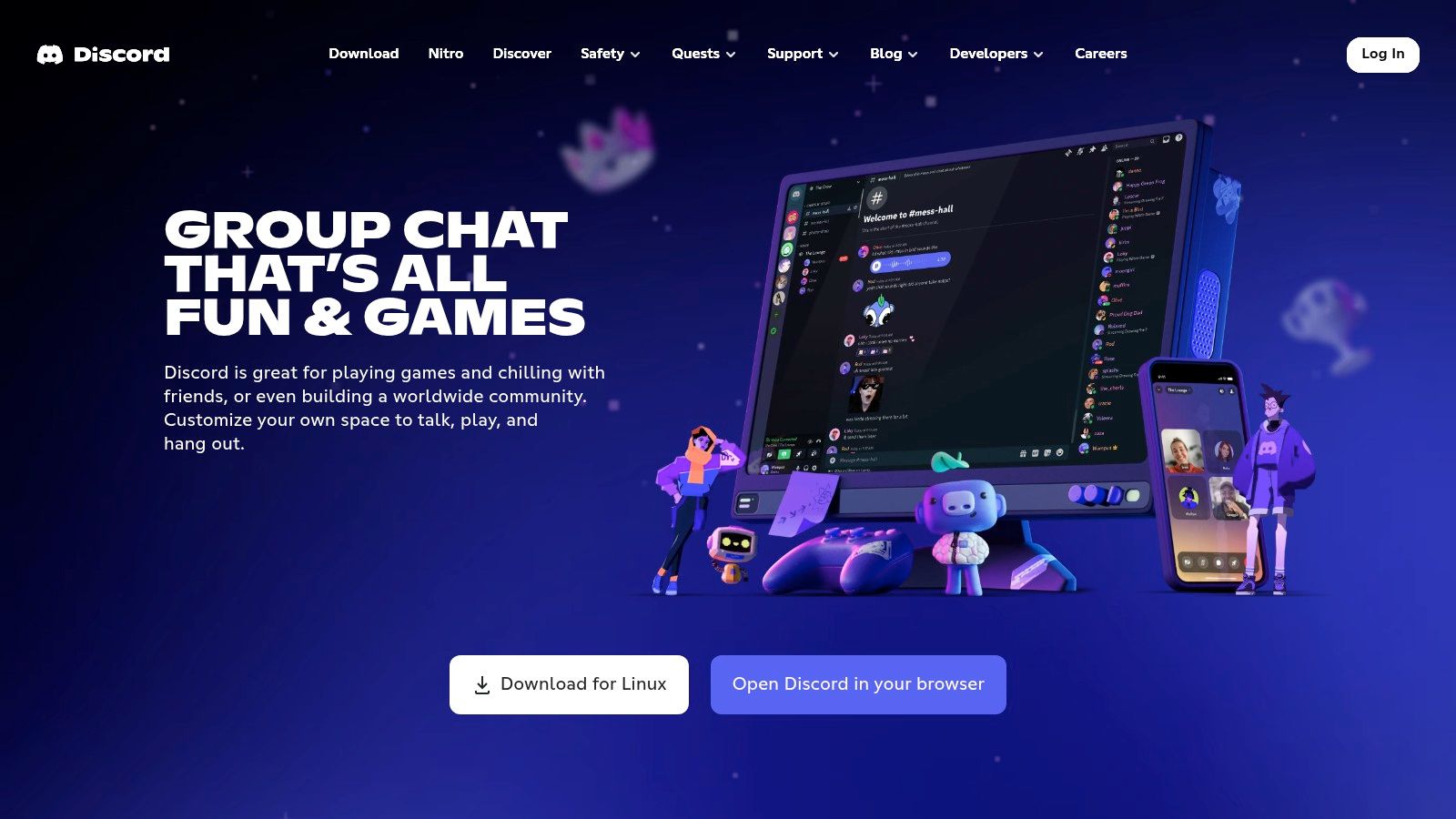
For example, a Shopify store owner selling handmade jewelry could create a Discord server where customers can discuss their favorite pieces, get styling advice, receive exclusive previews of new collections, and even participate in workshops. An arts and crafts business owner could use Discord to connect with other artists, share techniques, collaborate on projects, and build a supportive community around their craft. The real-time nature of Discord facilitates a sense of immediacy and connection that’s difficult to replicate in other online community platforms.
Discord's structure revolves around servers, which act as dedicated spaces for specific communities. Within each server, users can join various channels dedicated to different topics, formats (text, voice, video), and purposes. These channels can be further customized with roles and permissions, granting different levels of access and moderation capabilities to members. The platform also boasts seamless integration with bots, which can automate tasks like welcoming new members, moderating content, and even providing fun interactive elements. This allows for a high degree of customization and control over the community environment. Features like screen sharing are particularly useful for educational purposes, enabling artists to conduct online tutorials or shop owners to demonstrate product features. You can Learn more about Discord and its community-building potential.
Features:
- Text, voice, and video channels
- Server customization with roles and permissions
- Integration of bots for automation and added functionality
- Screen sharing capabilities
- Direct messaging and group chats
Pros:
- Real-time communication fosters active communities
- Excellent for both small and large groups
- High-quality voice and video options
- Extensive customization options
Cons:
- Fast-paced conversations can be challenging to follow in highly active servers
- Content discovery across different servers is limited
- Moderation can be demanding in large communities
- The free tier has file size limitations
Pricing: Discord offers a free tier with generous features. Nitro, their paid subscription, provides enhanced features like increased file upload limits, custom emojis, and HD video streaming.
Technical Requirements: Discord is accessible through web browsers, desktop applications (Windows, macOS, Linux), and mobile apps (iOS, Android). No specialized hardware is required beyond a device with internet access.
Implementation Tips:
- Clearly define the purpose and rules of your Discord server.
- Establish a welcoming environment for new members.
- Utilize roles and permissions to manage access and moderation effectively.
- Explore and implement bots to enhance functionality and automate tasks.
- Actively participate in conversations and foster a sense of community.
Discord earns its place on this list due to its versatility, robust features, and ability to foster highly engaged communities. While other platforms like Facebook Groups offer broader reach, Discord excels in facilitating real-time interaction and providing a more focused, customizable environment. This makes it an ideal online communities example, particularly for Shopify store owners and arts and crafts businesses aiming to build strong, interactive communities around their brands or niches. Visit the Discord website to explore its features.
4. Facebook Groups
Facebook Groups provide a readily accessible platform for building online communities, making them a strong contender among online communities examples, especially for Shopify store owners and arts and crafts business owners. They allow you to connect with customers and fellow creators around shared interests, promoting products, fostering loyalty, and gathering valuable feedback. Their various privacy settings allow for different types of community interactions, from public discussions to exclusive member-only groups. The ability to share various content types, including live videos, polls, and events, adds to their versatility for diverse community needs.
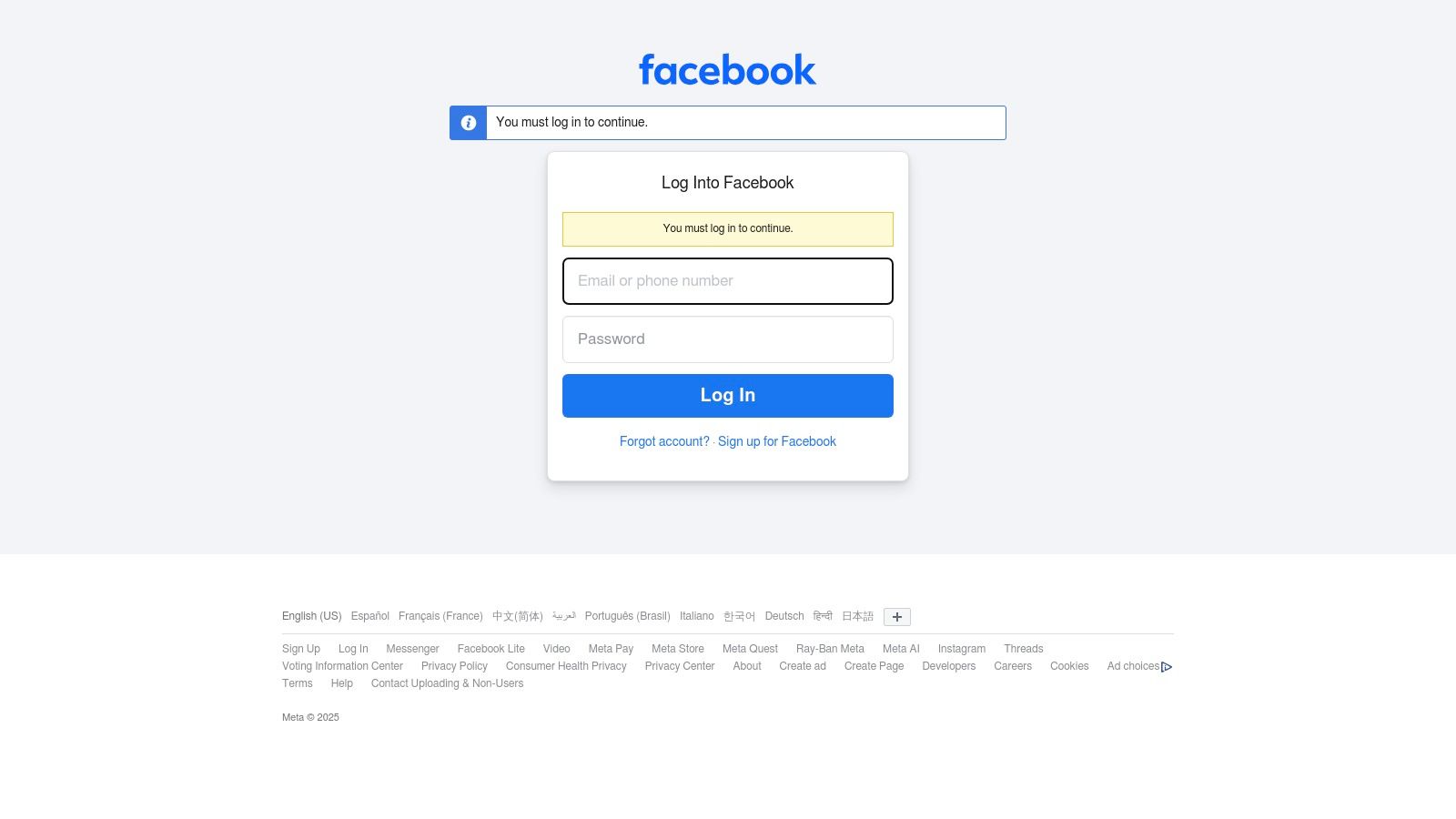
For Shopify store owners, Facebook Groups can become thriving hubs for showcasing new products, offering exclusive deals, and gathering pre-launch feedback. Imagine creating a private group specifically for your VIP customers, giving them early access to sales and soliciting their input on new designs. Arts and crafts businesses can leverage Groups to build communities around specific crafts, share tutorials, and host virtual workshops. Think of a group dedicated to knitting enthusiasts where members share patterns, troubleshoot projects, and showcase their finished creations.
Features:
- Multiple privacy options (public, private, hidden): Control who can see and join your group, allowing you to tailor the community experience. Public groups are great for open discussions and broader reach, while private and hidden groups are ideal for exclusive communities and sensitive topics.
- Integration with Facebook's broader ecosystem: Seamlessly share content from your Facebook Page to your Group, expanding your reach and engaging existing followers. Members can also easily invite their Facebook friends, fostering organic growth.
- Support for various content types including live video, Events organization and management, Admin and moderation tools: Host engaging live Q&A sessions, organize online craft fairs, or manage member discussions with robust admin tools. These features provide a dynamic platform for community interaction.
Pros:
- Leverages existing Facebook user base: Tap into a massive pool of potential members already active on Facebook.
- Familiar interface for most users: Minimizes the learning curve for both admins and members.
- Mobile app is well-optimized: Provides a seamless experience for users on the go.
- Robust notification system: Keeps members informed about group activity, promoting engagement.
Cons:
- Tied to Facebook's personal profiles: Can be a barrier for individuals who prefer to keep their personal and business lives separate.
- Limited customization options: Design flexibility is restricted compared to dedicated community platforms.
- Algorithmic feed can limit post visibility: Not all members may see all posts, requiring strategic posting and engagement tactics.
- Privacy concerns associated with Facebook platform: Be mindful of Facebook's data privacy policies.
Pricing: Free
Technical Requirements: A Facebook account.
Comparison with similar tools: Compared to platforms like Discord or Slack, Facebook Groups offer less customization and advanced moderation features but benefit from the vast existing Facebook user base and familiar interface. Platforms like Mighty Networks offer more dedicated community features but require a paid subscription.
Implementation/Setup Tips:
- Define a clear purpose for your group: What specific needs will it address? What kind of community do you want to build?
- Establish clear group rules and guidelines: Maintain a positive and productive environment.
- Engage actively with your members: Respond to comments, ask questions, and foster discussions.
- Utilize the various content formats: Experiment with live videos, polls, and events to keep the community dynamic.
- Promote your group on your other channels: Drive traffic from your Shopify store, social media profiles, and email list.
Website: https://www.facebook.com/groups/
Facebook Groups offer a practical and accessible way to build online communities, particularly for Shopify store owners and arts and crafts businesses seeking to engage their customer base and foster deeper connections within their niche. While they might lack some of the advanced features of dedicated community platforms, their ease of use and access to a vast user base make them a valuable tool for building and nurturing online communities.
5. Slack
Slack, while primarily known as a workplace communication tool, is a powerful option for building and managing online communities, offering a structured and organized environment. Its channel-based system allows communities to segment discussions by topic, project, or team, fostering focused conversations and efficient knowledge sharing. This makes it a strong contender among online communities examples, particularly for those seeking a platform beyond the traditional forum or social media group. For Shopify store owners and arts and crafts business owners, this can be invaluable for coordinating projects, sharing industry news, or providing customer support.
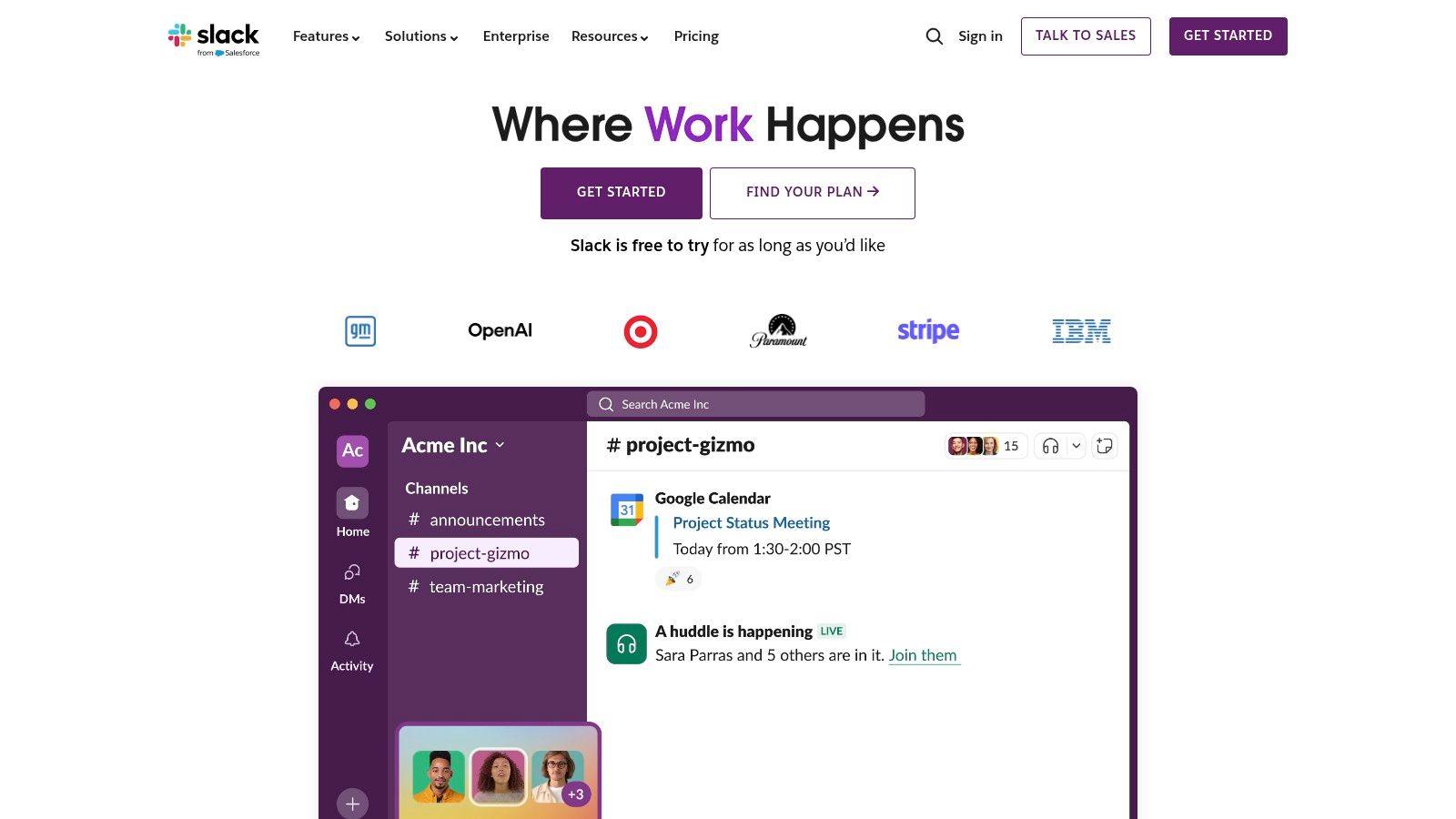
Slack's robust feature set goes beyond basic messaging. Thread-based conversations keep discussions organized and easy to follow, preventing important information from getting lost in the noise. Imagine an arts and crafts community discussing a specific technique – a dedicated thread keeps the conversation focused, while the main channel remains open for other topics. The extensive app integrations ecosystem allows communities to connect Slack with other tools they use daily, such as Google Drive, Trello, or Zoom, streamlining workflows and centralizing communication. For Shopify store owners, integrating Slack with their e-commerce platform can provide real-time order notifications and customer support inquiries directly within their community workspace. Powerful search functionality makes it easy to find past conversations and shared files, acting as a valuable knowledge base for the community.
Features:
- Organized channel-based communication
- Thread-based conversations
- Extensive app integrations ecosystem
- Powerful search functionality
- File sharing and collaboration tools
Pros:
- Clean, professional interface
- Excellent organization of conversations
- Strong mobile and desktop apps
- Robust API for custom integrations
Cons:
- Free tier has message history limitations which can be problematic for growing communities that need to access past information.
- Can become expensive for larger communities as they require paid plans to unlock full functionality.
- Less intuitive for casual, non-professional users who might be accustomed to simpler social media interfaces.
- Limited discovery features for broader community engagement, making it less suitable for communities looking to attract new members organically.
Pricing: Slack offers a free plan with limited features, followed by paid plans with increasing functionalities and member limits. Specific pricing details are available on their website.
Technical Requirements: Slack is accessible via web browser, dedicated desktop apps (Windows, macOS, Linux), and mobile apps (iOS, Android).
Comparison with similar tools: While platforms like Discord and Facebook Groups offer similar community features, Slack differentiates itself with a more professional environment and robust integrations, making it ideal for business-oriented communities or those needing tight integration with their existing workflows.
Implementation/Setup Tips:
- Plan your channel structure: Before inviting members, carefully consider the topics and categories relevant to your community and create dedicated channels accordingly. This will ensure a well-organized and easily navigable space.
- Utilize app integrations: Explore the Slack App Directory and integrate relevant tools to enhance community functionality and streamline workflows.
- Establish clear community guidelines: Set expectations for member behavior and communication to maintain a positive and productive environment.
- Engage actively: As a community manager, actively participate in discussions, answer questions, and foster a sense of belonging.
Website: https://slack.com
Slack's structured approach to communication, combined with its powerful features and integrations, makes it a compelling choice for Shopify store owners, arts and crafts business owners, and other online communities seeking a professional and organized platform. While the cost for larger groups and the learning curve for casual users should be considered, its benefits in terms of productivity and efficient knowledge sharing make it a valuable online community example.
6. Mighty Networks: Your All-in-One Community Platform
Mighty Networks stands out as a robust platform specifically designed for building and monetizing online communities. Unlike generic social media platforms, Mighty Networks provides a dedicated space for fostering deeper connections and engagement among members. This makes it a compelling online communities example, especially for Shopify store owners and arts and crafts business owners looking to cultivate a loyal customer base and drive sales. It allows creators to combine community features with online courses and paid events, creating a comprehensive ecosystem for their audience. This platform emphasizes relationship-building among members, moving beyond simple content consumption to foster a sense of belonging.
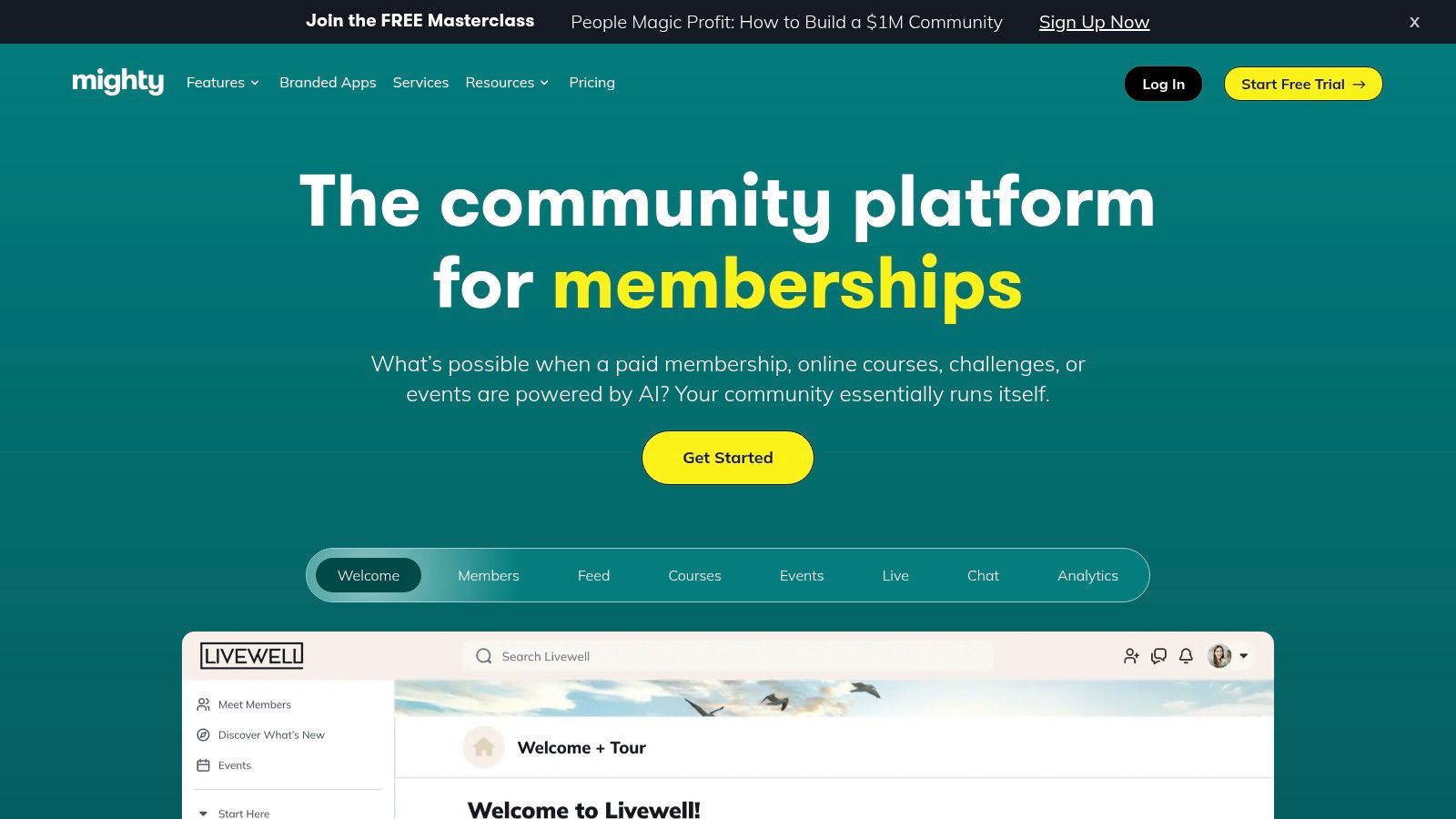
For Shopify store owners, a Mighty Network can become a vibrant hub for customers to discuss products, share creative uses, and provide feedback. Imagine a community where your customers showcase their handmade jewelry crafted with your beads, or share tips and tricks for using your art supplies. This organic engagement can lead to increased brand loyalty, word-of-mouth marketing, and ultimately, higher sales. Arts and crafts business owners can leverage the platform to offer exclusive workshops, tutorials, and challenges, further monetizing their skills and expertise.
Key features like white-label branding ensure your community reflects your unique brand identity. You can create and deliver online courses directly within the network, offering valuable educational content to your members. The integrated membership and subscription management tools simplify the process of offering tiered access and premium content. Native mobile apps provide a seamless experience for members on the go, further enhancing engagement. With built-in event hosting capabilities, you can organize virtual workshops, product launches, or community meetups, strengthening the bond within your network.
Features:
- White-label community building with custom branding
- Course creation and delivery tools
- Native mobile apps for communities
- Membership and subscription management
- Event hosting capabilities
Pros:
- Purpose-built for community monetization
- All-in-one solution (community, courses, events)
- Strong focus on member relationships
- No advertising or algorithms affecting content visibility
Cons:
- Higher price point compared to some alternatives (plans start at $33/month billed annually)
- Limited third-party integrations compared to more open platforms
- Less feature-rich for highly specialized use cases that might require extensive customization
- Learning curve for initial community setup and configuration
Implementation Tips:
- Define your community's purpose: What value will it offer to members? What are your goals for the community?
- Develop a content strategy: Plan engaging content that fosters discussion and interaction.
- Promote your community: Integrate your Mighty Network with your Shopify store and other marketing channels.
- Actively moderate and engage: Foster a welcoming and inclusive environment.
Comparison with similar tools: While platforms like Facebook Groups offer free community building, they lack the monetization features and focused environment of Mighty Networks. Thinkific and Teachable are excellent for online courses, but they don’t provide the comprehensive community-building aspects. Mighty Networks offers a unique blend of both.
Mighty Networks deserves its place in this list because it offers a powerful and dedicated platform for creating thriving, monetized online communities. By fostering genuine connections between members, it provides a valuable tool for Shopify store owners and arts and crafts business owners to build brand loyalty, generate leads, and drive sales. Visit Mighty Networks
7. Circle
Looking for online communities examples for your Shopify store or arts and crafts business? Circle is a powerful platform specifically designed for creators, brands, and businesses looking to cultivate thriving online communities. It offers a streamlined and customizable environment for building a branded community experience, making it a strong contender among other online community platforms. This makes it particularly attractive for businesses aiming to create a dedicated space for customer interaction, product feedback, and fostering brand loyalty. Circle prioritizes simplicity without sacrificing key features for engagement and monetization.
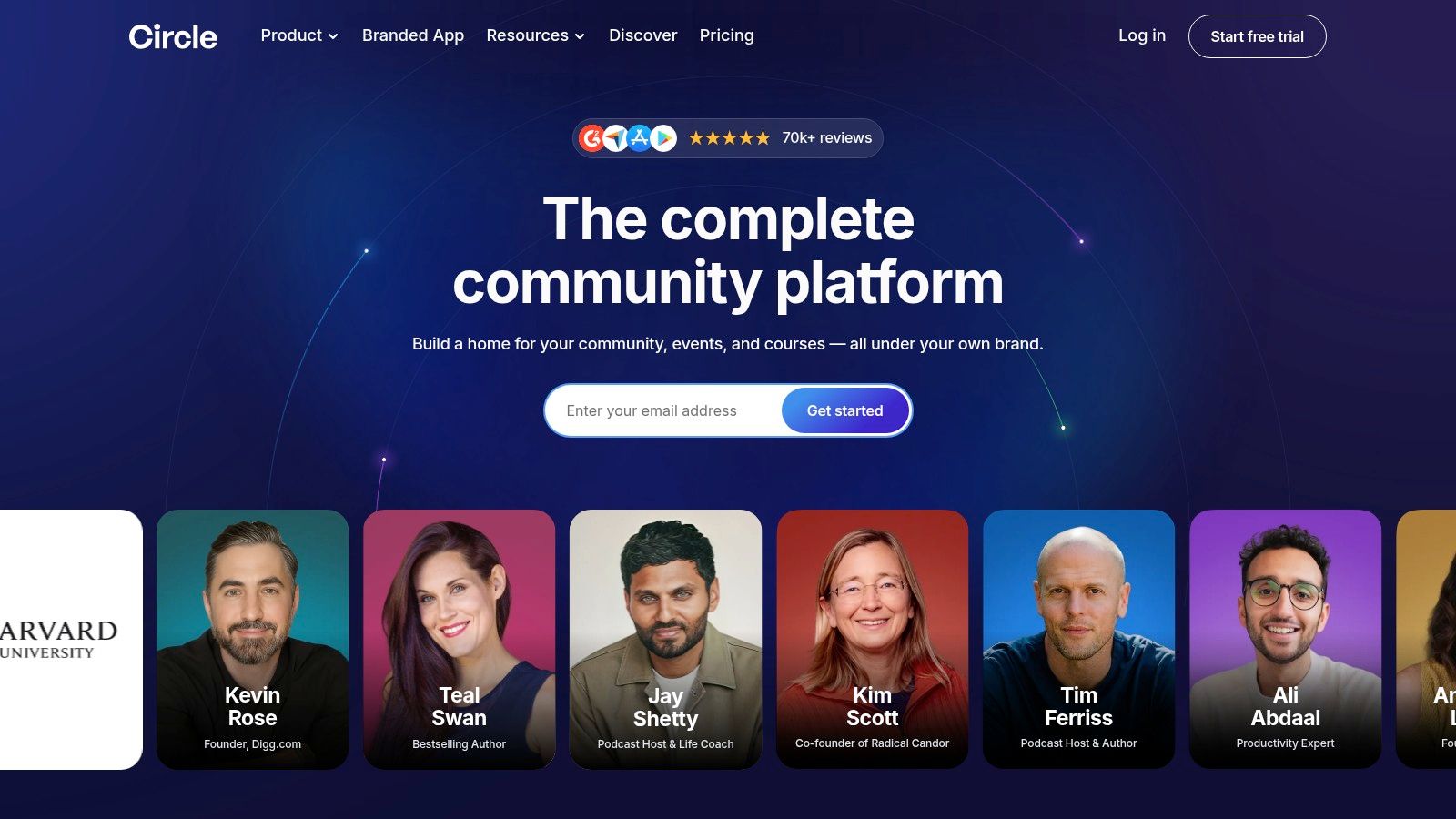
For Shopify store owners, Circle can be leveraged to create exclusive communities for VIP customers, offering early access to product releases, special discounts, and a direct line of communication with your brand. Imagine fostering a community where your customers can share their creative uses of your products, provide valuable feedback, and connect with fellow enthusiasts. For arts and crafts business owners, Circle provides a platform to host workshops, share tutorials, build a strong following around your craft, and even sell digital products or memberships for exclusive content. You could create a dedicated community where your customers can share their projects, ask questions, and learn from each other, building a sense of camaraderie and boosting engagement.
Circle provides multiple content formats, including discussions, posts, live streams, and courses, giving you flexibility in how you engage your audience. You can use discussions to facilitate conversations, posts for announcements and updates, live streams for real-time interaction, and courses to deliver premium educational content. Member management features, including roles and permissions, allow you to control access and moderate content effectively.
Circle also offers robust monetization tools, enabling paid memberships and providing avenues for recurring revenue. Integrations with tools like Zapier and ConvertKit allow you to automate workflows and connect with your existing marketing stack. You can learn more about these platforms and others by reviewing this helpful resource: Learn more about Circle.
Pros:
- Intuitive, Modern Interface: Easy to navigate and use, even for those new to community platforms.
- Branded Experiences: Strong focus on creating a cohesive brand experience within the community.
- Balance of Simplicity and Features: Offers powerful features without being overly complex.
- Responsive Customer Support: Provides helpful support to assist you in setting up and managing your community.
Cons:
- Developing Feature Set: As a relatively new platform, some advanced features are still under development.
- Limited Advanced Customization: While offering good customization, some advanced options are limited.
- Higher Price Point: Can be more expensive for smaller communities compared to some alternatives.
- Limited Native Integrations: Fewer direct integrations compared to more established platforms.
While pricing details aren't readily available on the main site, Circle's plans generally cater to different community sizes and feature requirements. Technical requirements are minimal, as the platform is entirely web-based.
Circle earns its place on this list by providing a dedicated and customizable platform that caters specifically to brands and creators. If you're looking to build a branded online community, Circle is a compelling option worth exploring. For more detailed insights, visit the Circle website.
8. Discourse
Discourse stands out as a robust and versatile platform among online communities examples, particularly well-suited for fostering in-depth discussions and building a knowledgeable community. It revitalizes the traditional forum format with a modern interface, featuring infinite scrolling for seamless browsing and real-time updates to keep users engaged. Whether you're a Shopify store owner looking to cultivate a loyal customer base or an arts and crafts business owner seeking a platform for sharing techniques and inspiration, Discourse offers a powerful solution for connection and collaboration.
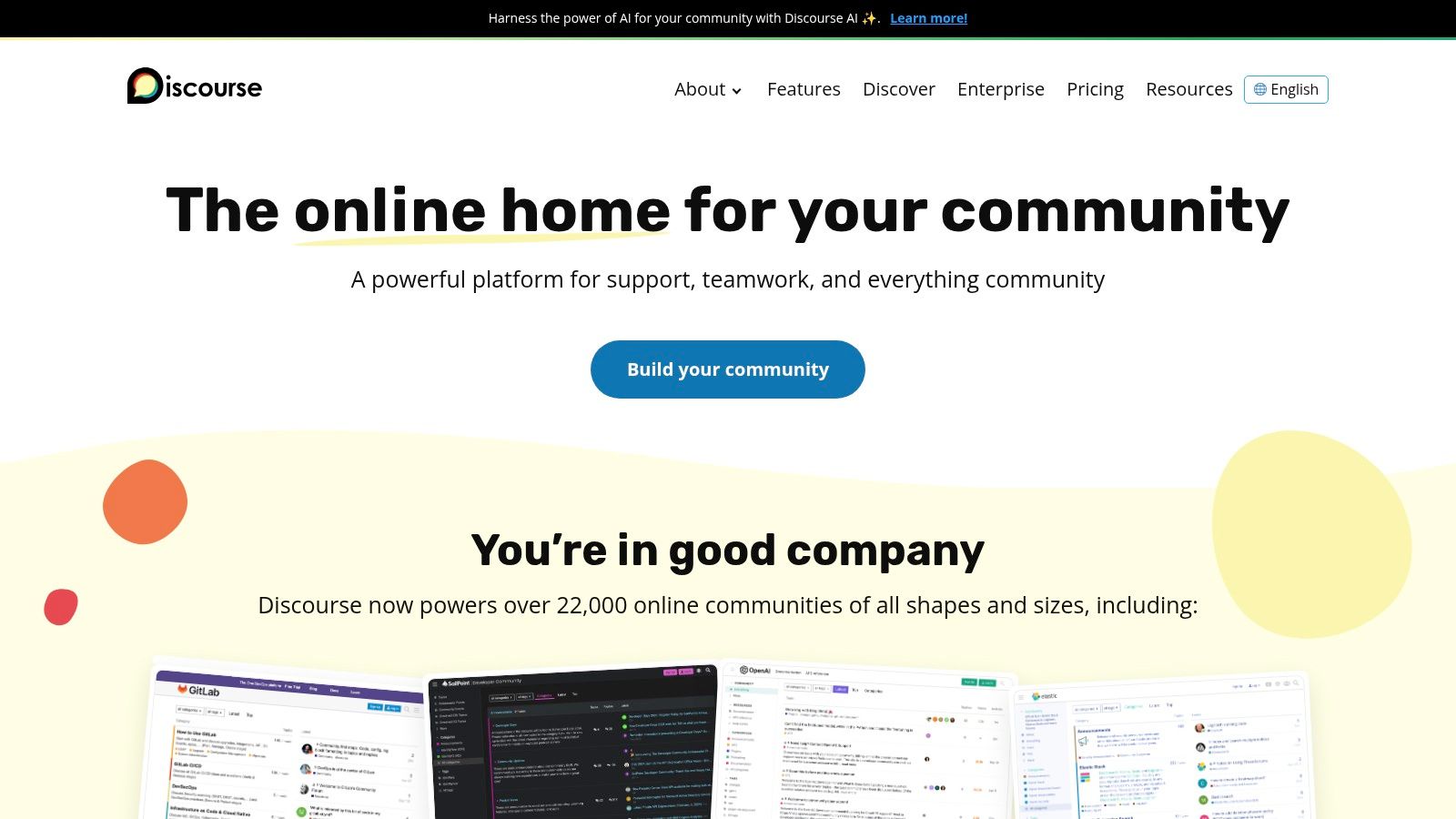
Discourse's structured approach, with categories and topics, allows for organized conversations around specific products, projects, or themes. For Shopify merchants, this could be dedicated forums for discussing individual product lines, troubleshooting common issues, or sharing user-generated content. Arts and crafts businesses could use categories for different crafting techniques, material discussions, or project showcases. The built-in trust level and moderation system encourages positive interactions and allows community members to earn privileges as they contribute, fostering a sense of ownership and responsibility. Gamification elements, such as badges and likes, further enhance engagement and encourage participation.
A significant advantage of Discourse is its flexibility. It can be self-hosted, giving you complete control over your data and customization options, or used as a hosted service for a more hands-off approach. This makes it suitable for businesses of all sizes and technical capabilities. The extensive plugin ecosystem allows you to tailor the platform to your specific needs, integrating with other tools and services you may already be using. For developers, the comprehensive API opens up even more possibilities for customization and integration.
Pricing: While the Discourse software itself is open-source and free, hosting options vary. Self-hosting involves server costs and technical expertise. Their hosted service, Discourse Hosting, starts at $100/month and scales based on community size and required resources.
Technical Requirements (Self-Hosting): A server running Ubuntu 18.04 or later, PostgreSQL, Redis, and Mailgun or a similar email service are required for self-hosting. Some technical proficiency is necessary for installation and maintenance.
Comparison: Compared to platforms like Slack or Discord, which are more chat-focused, Discourse excels in facilitating longer-form discussions and knowledge sharing. It's less about instant messaging and more about building a repository of valuable information that community members can search and reference over time.
Implementation Tips:
- Plan your category structure: Think about the key topics and discussions you want to facilitate in your community and create a clear and logical category structure.
- Seed the community with initial content: Don't launch an empty forum. Provide some initial content to spark conversation and guide early members.
- Actively moderate and participate: Engage with your community, answer questions, and address concerns to build trust and encourage participation.
- Explore the plugin ecosystem: Discourse has a wide range of plugins that can enhance functionality and integrate with other services.
Pros:
- Open-source with a strong development community
- Excellent for long-form discussions and knowledge sharing
- Self-hosting option for complete control
- Built-in gamification and trust system
- SEO-friendly content structure
Cons:
- Steeper learning curve for setup and administration (especially for self-hosting)
- Can be resource-intensive if self-hosted
- Less real-time focused than chat-based platforms
- Hosted solution can be more expensive than some alternatives
Website: https://www.discourse.org
Discourse deserves its place on this list because it offers a powerful and flexible platform for building thriving online communities centered around in-depth discussions and knowledge sharing. Its structured format, combined with modern features and a strong focus on community building, makes it an ideal choice for businesses seeking to foster meaningful connections with their customers and audience.
9. Tribe
Tribe is a powerful platform specifically designed for businesses seeking to cultivate thriving online communities around their products or services. It offers a comprehensive suite of tools to create a fully branded and customizable community experience that integrates seamlessly with your existing technology stack. This makes Tribe a valuable addition to our list of online communities examples, particularly for businesses focused on growth and customer engagement. If you're a Shopify store owner or run an arts and crafts business, Tribe's features can help you connect with customers, build brand loyalty, and drive sales.
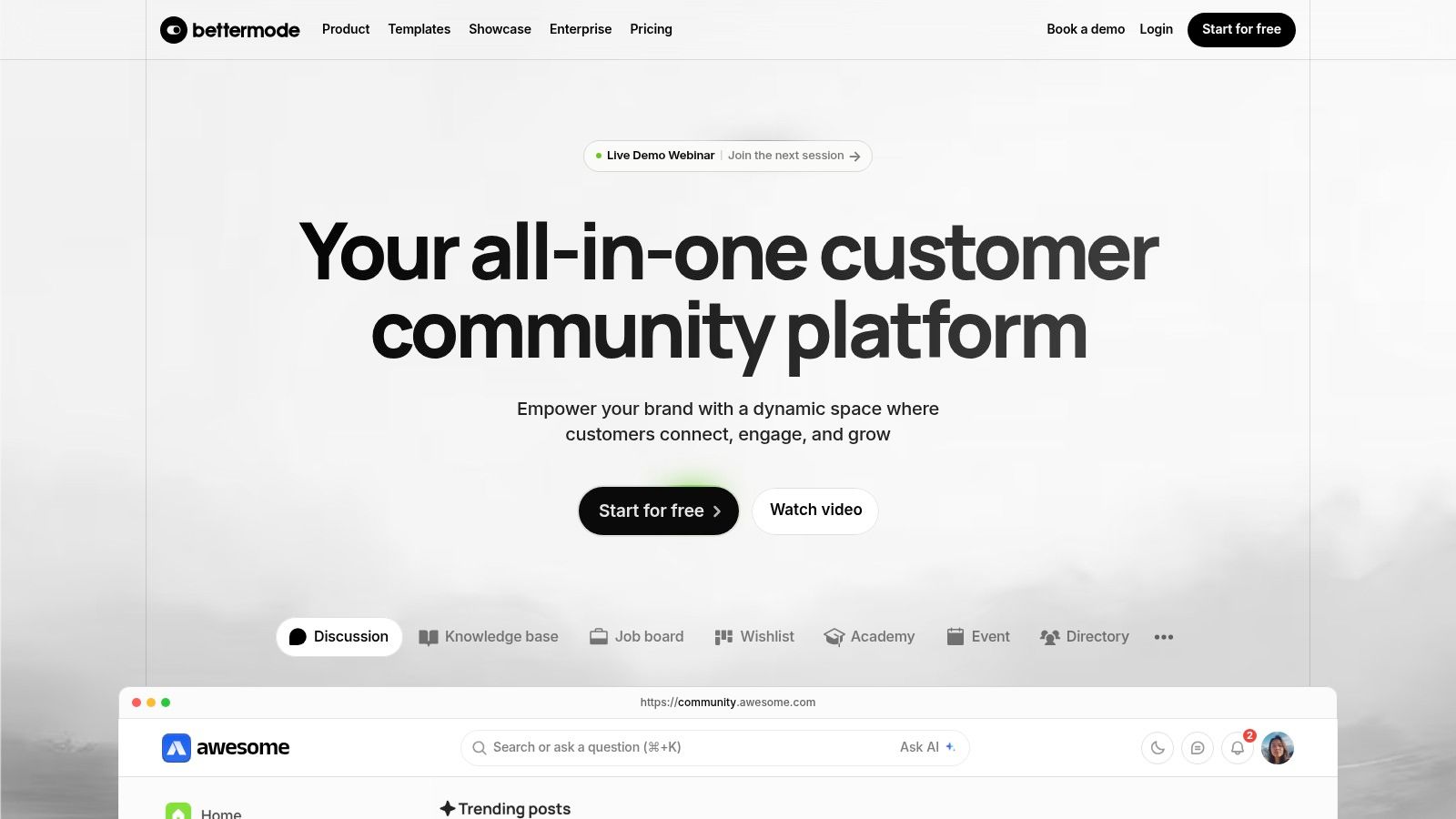
Imagine having a dedicated space where your customers can connect with each other, share their creations (if you're in the arts and crafts sector), offer product feedback, and help each other troubleshoot issues. Tribe facilitates this kind of engagement through features like dedicated spaces for different types of content and discussions, gamification elements to encourage participation, and robust analytics to measure the community's health and growth. For example, a Shopify store selling handmade jewelry could create a Tribe community where customers can share photos of how they style their pieces, ask questions about care instructions, and even participate in design challenges. An arts and crafts business could use Tribe to host online workshops, share tutorials, and build a supportive community around a shared passion.
Tribe's white-label functionality allows you to fully customize the community's appearance to match your brand identity, creating a consistent experience for your customers. Its wide range of integrations allows you to connect Tribe with your existing CRM, email marketing platform, and other essential business tools. This streamlines your workflow and ensures that your community activities are aligned with your overall business strategy. For instance, you could integrate Tribe with your Shopify store to automatically offer exclusive discounts to community members or personalize product recommendations based on their community activity. Learn more about Tribe and how it can be used to foster online success.
While Tribe's pricing varies based on the features and support required, the platform offers a range of plans to suit different business sizes and budgets. It's important to note that more advanced features, such as advanced analytics and dedicated support, are typically included in the higher-tier plans. Setting up a fully customized Tribe community can require some initial investment of time and resources, especially if you're aiming for deep integration with your existing systems. Furthermore, while Tribe offers a mobile experience, it's not as fully featured as the desktop version, which might be a consideration for businesses with a predominantly mobile audience.
Pros:
- Highly customizable to match brand identity
- Strong focus on business use cases
- Extensive integration capabilities
- Good analytics for measuring engagement
Cons:
- Less suitable for non-business communities
- Advanced features require higher-tier plans
- Can require significant setup for full customization
- Mobile experience not as robust as desktop
Website: https://tribe.so
Tribe offers a powerful solution for businesses looking to leverage the power of online communities for growth and customer engagement. While the platform may require a more significant investment compared to some simpler solutions, its robust feature set and focus on business applications make it a compelling choice for Shopify store owners, arts and crafts businesses, and other businesses invested in building thriving online communities.
10. Vanilla Forums
Vanilla Forums stands out among online communities examples as a robust, enterprise-grade platform specifically designed for businesses seeking to foster customer support, drive ideation, and facilitate knowledge sharing. Unlike more general-purpose community platforms, Vanilla Forums prioritizes features essential for large organizations, including advanced moderation, comprehensive analytics, and robust security. This makes it a powerful tool for Shopify store owners and arts and crafts business owners looking to cultivate a thriving online community around their brand.
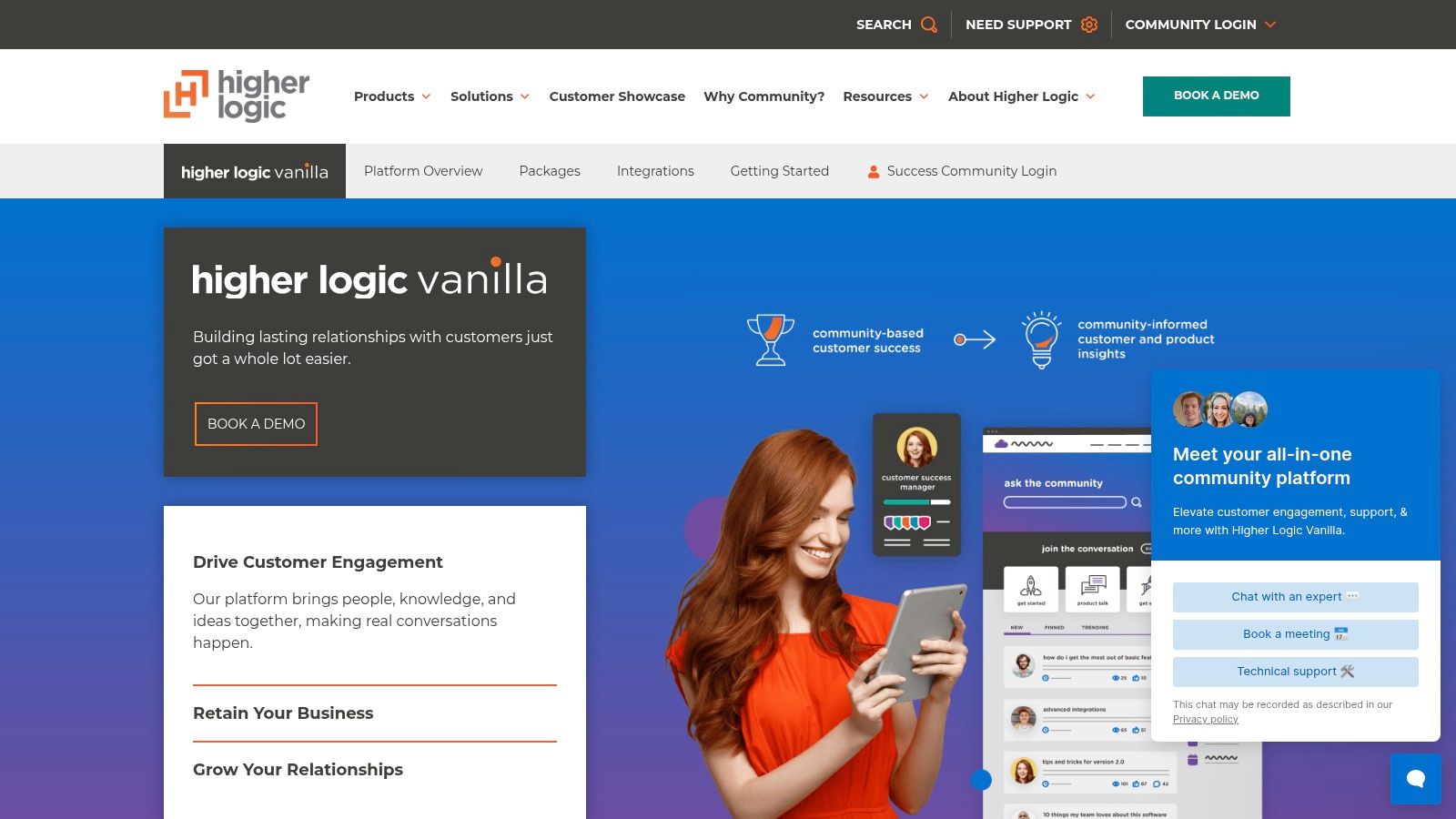
For Shopify store owners, Vanilla Forums can become a central hub for customer support, deflecting tickets and fostering peer-to-peer assistance. Imagine customers troubleshooting common issues together, sharing tips and tricks for using your products, and even suggesting new product ideas directly within the forum. This not only reduces support costs but also builds a strong sense of community and brand loyalty. Similarly, arts and crafts business owners can leverage the platform to create a dedicated space for their customers to share their creations, ask questions, and learn new techniques. This fosters a vibrant ecosystem of creativity and encourages repeat business.
Vanilla Forums offers advanced moderation and content curation tools, empowering businesses to maintain a positive and productive community environment. Gamification features, such as badges and leaderboards, incentivize participation and encourage positive interactions. The extensive theming and customization options allow you to seamlessly integrate the forum with your existing brand aesthetic. Beyond basic forum functionality, Vanilla Forums provides powerful Q&A, ideation, and knowledge base features, transforming your community into a valuable resource center for both customers and your team.
Features:
- Advanced moderation and content curation tools
- Gamification and reputation systems
- Extensive theming and customization options
- Q&A, ideation, and knowledge base functionality
- Enterprise-grade security and compliance
Pros:
- Robust solution for large-scale communities
- Strong focus on business and enterprise needs
- Excellent for knowledge management and support
- Comprehensive analytics and reporting
Cons:
- Higher price point targeted at enterprise customers (contact sales for pricing)
- Can be complex to set up and administer initially, although support and resources are available
- Less suitable for casual or hobbyist communities due to its feature-rich nature
- Requires dedicated resources to fully utilize its potential
Implementation Tips:
- Plan your community strategy: Define your goals and target audience before launching your forum.
- Customize your forum: Tailor the look and feel to match your brand and create a welcoming environment.
- Seed the community: Provide initial content and encourage early participation to get the ball rolling.
- Moderate actively: Maintain a positive and productive environment by actively moderating discussions.
- Integrate with other tools: Connect your forum with your CRM, support platform, and other relevant tools.
Compared to free or more basic community platforms, Vanilla Forums offers a significantly more powerful and scalable solution. While the higher price point and more involved setup may be a deterrent for smaller businesses, for Shopify store owners and arts and crafts businesses with ambitious growth plans, the investment can pay off significantly by fostering a loyal customer base, driving product innovation, and reducing support costs.
Top 10 Online Community Platforms Comparison
| Platform | Core Features/Unique Selling Points | User Experience / Quality ★ | Value & Pricing 💰 | Target Audience 👥 | Recommended 🏆 |
|---|---|---|---|---|---|
| Tevello | Seamless Shopify integration, customizable courses & communities ✨ | ★★★★★ (5.0 from 260+ reviews) | Contact for pricing, all-in-one value | Shopify store owners, creators | 🏆 Top pick for Shopify merchants |
| Topic-based subreddits, karma system, AMAs | ★★★★☆ | Free, optional Reddit Premium | General public, interest groups | ||
| Discord | Text/voice/video channels, bots, screen sharing | ★★★★☆ | Free with paid Nitro upgrades | Gamers, active communities | |
| Facebook Groups | Privacy levels, live video, events, broad Facebook ecosystem | ★★★☆☆ | Free | Facebook users, casual groups | |
| Slack | Channel-based chats, app integrations, professional tools | ★★★★☆ | Free tier limited, paid plans expensive | Businesses, professional teams | |
| Mighty Networks | Branded communities, courses, events, no ads | ★★★★☆ | Higher price point | Creators, community builders | |
| Circle | Clean design, branded spaces, monetization tools | ★★★★☆ | Mid to high pricing | Creators, brands | |
| Discourse | Modern forums, gamification, self-hosting option | ★★★★☆ | Self-host/free hosted paid | Tech-savvy communities, forums | |
| Tribe | White-label, integrations, gamification, analytics | ★★★★☆ | Tiered pricing, higher for advanced | Businesses, product communities | |
| Vanilla Forums | Enterprise-grade, moderation, gamification, security | ★★★★☆ | Premium pricing, enterprise focus | Large enterprises |
Building Bridges in the Digital Landscape: Choosing the Right Community for You
Finding the right online community can be transformative, connecting you with fellow Shopify store owners, artists, craftspeople, and other entrepreneurs who share your passions and interests. We've explored a diverse range of online communities examples, from established platforms like Reddit and Facebook Groups to specialized solutions like Tribe, Discourse, and Vanilla Forums. Each platform offers unique features, catering to different community needs and sizes. Remember, the key takeaways are to consider your target audience, the type of engagement you want to foster, and the level of customization and integration you require. For example, if you're primarily focused on building a tightly knit community around your Shopify store with integrated courses and content, a platform like Tevello might be ideal, while platforms like Discord or Slack might be better suited for quick communication and collaboration.
When implementing any of these tools, carefully consider factors like moderation capabilities, member management, and the overall user experience. These details can significantly impact the health and growth of your online community. Building and nurturing a thriving online space takes dedicated effort, but the rewards are substantial. Growing a dedicated customer base can be a significant challenge, and if you’re looking for ways to expand your business acumen while maintaining flexibility, consider exploring fractional executive jobs. Top Fractional Executive Jobs in 2025 | Flexible High-Impact Roles from Shiny highlights the potential of these dynamic roles.
By strategically choosing and nurturing your online community, you can create a vibrant hub for connection, collaboration, and growth. Dive in, explore the online communities examples discussed, and discover the perfect fit for your unique business needs. Ready to create a thriving community directly integrated with your Shopify store? Explore the power of integrated courses, memberships, and community building with Tevello. It's the perfect platform for entrepreneurs seeking to connect deeply with their audience and foster lasting relationships.

